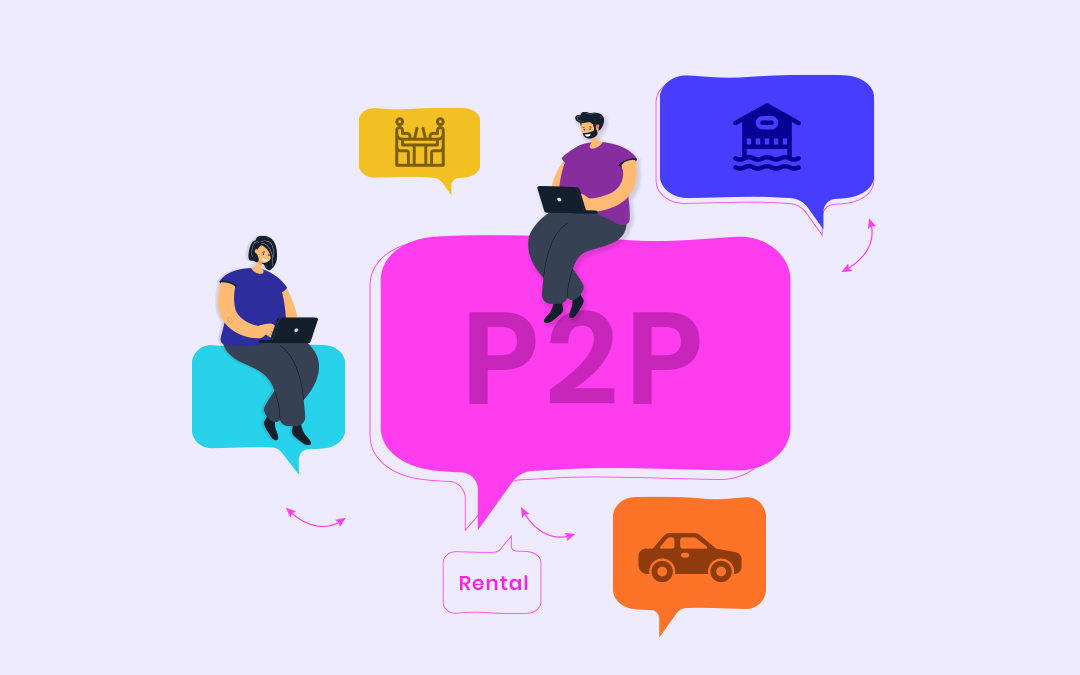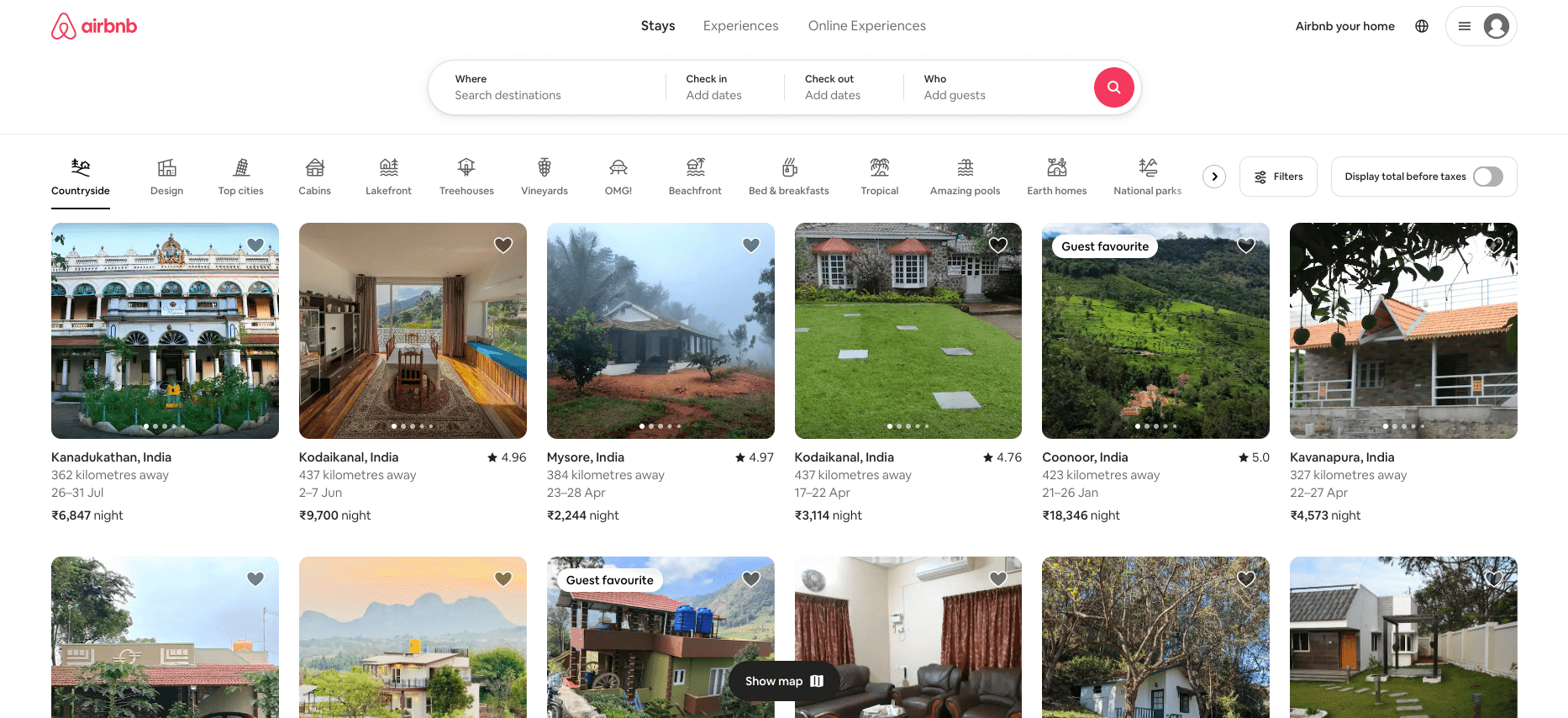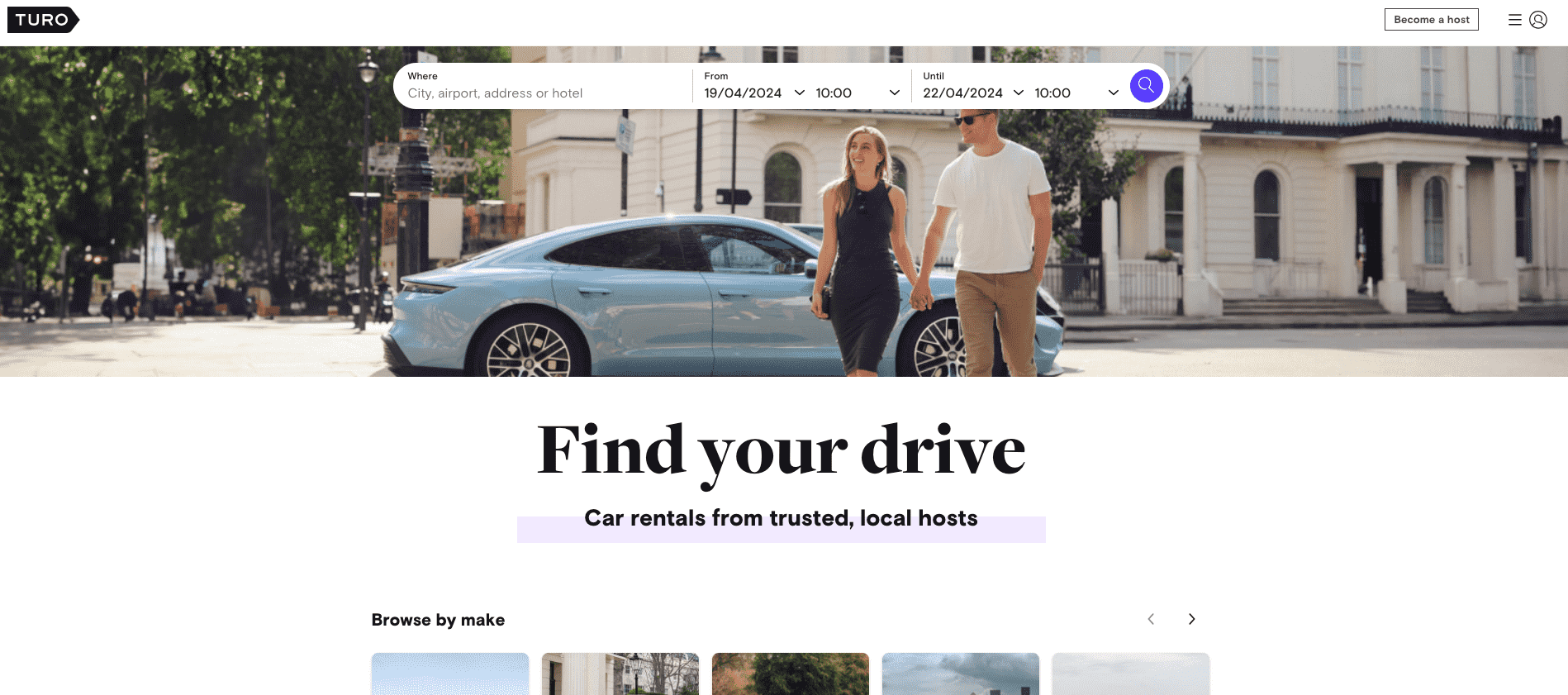
How To Start a Peer-to-Peer Rental Marketplace In 2024?
Are you wondering how to start a peer-to-peer rental marketplace business? Then this blog is exclusively for you! We have given a few leading business examples to cheer you up!
Have you ever thought about how platforms like Airbnb have changed the way we travel and stay? Or how have sharing economy ideas changed how we get things and services?
In Leigh Gallagher's book "The Airbnb Story," we find a passage that goes:
"At the end of the day, the reason why Airbnb is succeeding at the level that it is is not because of some magic potion or fairy dust that’s been put on some algorithm,” and “It is because we’ve built a platform that allows people to interact with people and have a transformative experience.”
If you think about it, this narrative here applies to all peer-to-peer rental marketplaces, not just Airbnb. People see the value of these marketplaces, where individuals share things in ways that help everyone and the environment.
Now, market studies reveal that the peer-to-peer rental marketplace was worth $152.98 billion in 2022, and it's expected to grow to $1701.2 billion by 2032.
As the market grows, more people want to join in. If you're one of them and want to start your own peer-to-peer business, this guide is for you.
Here is the Extensive Guide you Need!
Understanding the Peer-to-Peer Business Model
The purpose of the peer-to-peer business model is to connect individuals directly to exchange goods, services, or resources without traditional companies in between.
It's a digital marketplace where people can share, rent, or trade with each other.
Here's how it works: Instead of buying from a store, you might rent a tool from someone nearby through a P2P platform. Or, you might offer your spare room for rent to travellers.
These platforms provide a space for these exchanges to happen, often taking a small fee from each transaction.
What makes P2P models unique is that they rely on regular people, like you and me, to both provide and consume goods and services.
This creates a community-driven economy where everyone can benefit.
Trust is essential in P2P models. Users typically rely on reviews and ratings to determine who they want to transact with.
This helps build confidence in the system and ensures a positive experience for all involved.
Types of Peer-to-Peer Rental Marketplaces
There are many types of peer-to-peer rental marketplaces in the industry for a number of things, they range from immovable assets like a guest room or a warehouse to movable assets such as a luxury car to a garage toolkit.
Here are some of the best P2P rental marketplace ideas that have much scope in the upcoming years;
- Online warehouse rental business
- Fitness equipment rental business
- Furniture rental business
- Car rental business
- Venue rental business
- Vacation house rental business
- Office space rental business
These are just a few among the many rental business ideas that someone who wants to start a peer-to-peer rental marketplace can look into.
You can choose to start any of them based on the demand for the thing in the location where you plan on starting the business.
Top Peer-to-Peer Rental Marketplaces in 2024
Here we have attached some peer-to-peer rental marketplace examples so you can look into them and get a better understanding of the peer-to-peer rental marketplaces.
Read on to find out what they are.
1. Airbnb

Airbnb is a classic example of a peer-to-peer rental marketplace. It is the pioneer of the online marketplace business model.
The objective of this business model is to connect the people looking for houses and the people who are renting out their own for a specific time and price.
2. Turo

Turo is a peer-to-peer car rental marketplace, based in the US. Here, car owners can rent out their cars to others for short periods through Turo's platform.
Turo’s business model has gained trust in the industry for changing the way people borrow and use cars.
3. Peerspace

Take Peerspace as another great example. It's a short-term space rental platform for event venues. Whether you need a space for a party, meeting, or workshop, you can rent it for the exact time you need.
This service operates in various European and American cities.
These examples will help you gain a complete understanding of what peer-to-peer rental marketplaces are.
Starting a Peer-to-Peer Rental Marketplace
Now if you have a better idea of peer-to-peer rental marketplaces, let's now take a look at the steps to start a peer-to-peer rental marketplace.
There are three essential things you need to do to start a peer-to-peer rental marketplace. This involves::
- Finding your rental niche
- Creating a rental business plan
- Launching your marketplace platform
1. Define Your Niche and Target Audience
So, remember how we talked about all the different rental stuff you can do? Well, now the first thing you need to do to begin is decide what your rental niche is.
To choose this, you need to do market research and find out what types of rentals are popular and what is in demand in your business location. Then you can choose the specific type that interests you.
Let's say you live in a beach town where everyone loves kayaking. Most locals here have their own kayak, but they only use it once in a while. Now, tourists come by wanting to kayak, but they don't want to buy one just for a quick trip. Plus, renting from local shops is pricey.
You see, there's supply and there's demand for kayaks in the locality, so now you could make it your peer-to-peer rental niche!
Through your P2P kayak rental, locals rent out their kayaks to tourists. Locals make some extra cash, tourists save some money, and you get a service fee for connecting them.
By identifying your target audience and defining your niche, you can make your rental business stand out and succeed.
2. Create a Business Plan
Once you decide on your niche and identify your target audience, the next thing to do is find out how you're going to manage your business. A-Z!
Create a business plan and list out everything particular about your business, from the name to goals and profit expectations, marketing strategies, etc.
When you do this, you get a full idea of what you want to do, on what scale you are doing it, and what returns you can get from it.
3. Launch Your Marketplace Platform
Now that you've decided on your niche and created a comprehensive business plan, the next step is to build and launch your rental marketplace platform.
If you're unsure about how to launch your platform, don't worry—we'll guide you through it. When it comes to creating your rental business platform, there are two main approaches: custom development and ready-made solutions.
Let's take a closer look at what each of these entails.
Custom Development
The first way to build your P2P rental marketplace is to start from scratch.
This means you find a team of developers, tell them exactly what you want your platform to do, and they build it for you. This way, you get to pick every single feature and how everything works.
Here's how custom development works:
- First, you hire a development firm.
- You share the requirements for your platform.
- They start by designing the user interface and experience.
- They develop the backend infrastructure and functionality.
- The platform is then tested for usability, performance, and security.
- You check the platform and have them implement any necessary revisions or enhancements.
- The platform is then launched for public use.
Even if the process requires a high investment of time and resources, the end result will be exactly what you wanted when you chose custom development.
Now, lets look into the other option. which is,
Readymade Solution
Another way to start your platform is by using a ready-made solution.
Essentially, a ready-made solution is an online platform(web and mobile app) that includes the necessary features and functionalities for a specific type of online business, like a rental marketplace.
Here, you purchase the pre-built platform, rebrand it to fit your business and then launch it.
The best thing is that there are lots of options out there that are specifically made for different rental businesses.
So, whether you're into vacation rentals, car rentals, or renting out spaces and stuff, there's probably a ready-made solution for you.
Also, ready-made solutions are considered cost-effective options because they already have the features you need built into them, and you don't have to spend all your resources starting from scratch.
This allows you to quickly launch your platform, even within a tight budget.
And there you have it! The two ways in which you can launch your rental marketplace. Now it's time for you to decide how you want to proceed.
Just so you know, both these options come with their own set of perks and drawbacks, so you need to choose which option is right for you based on your goals for your platform.
In case you decide to launch your platform with a readymade solution, you can always check out our readymade solutions for peer-to-peer rental marketplaces which include,
- Airbnb clone script - for launching a vacation rental platform
- Car rental script - for launching a vehicle rental platform
- Space rental script - for launching a space rental platform
With all our rental marketplace solutions, you get:
- User-friendly apps for both iOS and Android users
- A website that also enables users to host and rent easily
- A web panel to help you manage the platform efficiently
And it doesn't stop here as all these solutions can be white-labelled to fit any kind of rental that you wish to offer. It doesn't just have to be about spaces and vehicles.
If you wanna know more about how our solutions can help you, do reach out to us. We will be happy to help you through the process of getting your rental platform up and running.
Do’s and Don’ts for Starting a P2P Rental Marketplace
You now know how to launch your P2P rental marketplace, but the process of starting the marketplace doesn't stop with simply launching your platform.
Having a list of dos and don'ts can be very helpful as you begin.
Here's a list of dos and don'ts for starting a P2P rental marketplace:
Do's for Starting a P2P Rental Marketplace
1. Research Your Market:
Understand what's in demand. See what works and what doesn't in your chosen niche.
2. Focus on the User Experience:
Make sure your platform is easy to use. A smooth, intuitive experience keeps users coming back.
3. Build Trust:
Implement verification processes, reviews, and ratings. Trust is key in peer-to-peer marketplaces.
4. Test Your Concept:
Start small to test your idea. Gather feedback and be ready to tweak your model.
5. Plan for Customer Support:
Be ready to help users with their questions and problems. Good support turns users into advocates.
6. Prioritise Safety and Security:
Ensure transactions and personal data are secure. This builds confidence in your platform.
7. Market Effectively:
Use social media, content marketing, and other strategies to spread the word about your marketplace.
Don'ts for Starting a P2P Rental Marketplace
1. Ignoring Legal Regulations:
Make sure you understand and comply with any laws or regulations that apply to your marketplace.
2. Skiping the Insurance:
Look into getting insurance to protect your business and its users.
3. Neglecting Platform Security:
Don’t cut corners on security. Protecting user information and transactions is critical.
4. Forgetting Mobile Experience:
Many users will access your platform via mobile devices. Don't overlook mobile optimization.
5. Overlooking Scalability:
Plan your growth. Ensure your platform can handle an increase in users and listings.
6. Underestimating the competition:
Understand your competition. Know what they do well and where you can do better.
7. Rushing Your Launch:
Don't rush to launch without proper testing and feedback. First impressions matter a lot.
Starting a P2P rental marketplace is exciting, but it’s also complex. So, keeping these dos and don'ts in mind can help you navigate the journey more smoothly.
Enhancing Your Peer-to-Peer Rental Marketplace
Once you launch your peer-to-peer (P2P) rental marketplace, the next big step is getting the word out.
You need to research and find some strategies to acquire users for your mobile app and website so it reaches its target audience.
Let's find out how you can market and promote your platform effectively.
Market and Promote the Platform to Attract Hosts and Renters
When it comes to P2P rental marketplaces, You want to attract both hosts who rent things on your platform and renters who need these things.
The best way to reach both of them is to practice some effective digital marketing strategies that can help you popularise your brand.
Here are a few strategies that can help you promote your marketplace:
1. Use Social Media Wisely:
Share engaging stories and posts about your platform on social media.
Highlight unique items available for rent or share user stories to catch people's attention.
2. Content Marketing:
Write blog posts or articles related to your rental niche. This can help improve your site's search engine ranking, making it easier for potential users to find you.
3. Offer Promotions:
Launch promotions like discounts for first-time users or referral bonuses.
This can encourage people to try out your platform and spread the word.
4. Monitor User Feedback and Provide Ongoing Customer Support
Listen to what your users have to say!
Pay attention to their comments and ideas to see what's going well and what needs fixing. Use this helpful information to make your website or app even better. Also, be quick to help users with any problems they have.
When you provide excellent customer support and make their experience your priority, they'll trust you more and stick with your platform.
Resources to Help You Learn How to Manage the Marketplace
Running a peer-to-peer (P2P) rental marketplace can be challenging, but don't worry! There are lots of helpful resources out there to guide you along the way.
Whether you want to learn more, pick up some new strategies, or meet people who are doing the same thing as you, these resources can help you out.
1. Books:
There are several books available that talk about running online marketplaces and the sharing economy.
Some recommended reads include "The Lean Marketplace" by Ben Balter, "The Airbnb Story" by Leigh Gallagher, and "Platform Scale" by Sangeet Paul Choudary.
2. Online Courses:
Many online platforms offer courses specifically designed for entrepreneurs looking to manage online businesses.
Websites like Coursera, Udemy, and LinkedIn Learning provide courses on topics such as marketplace strategy, customer acquisition, and platform management.
3. Communities:
Joining online communities and forums can be a great way to network with other marketplace operators, share insights, and seek advice.
Platforms like Reddit, Facebook Groups, and other specialised forums can provide valuable support and guidance.
By joining these communities, you get to learn from industry experts, network with peers, and stay updated on the latest trends.
Wrapping Up,
As we have reached the end of the blog, we hope that you now have a clear idea of what you need to do next to enter the peer-to-peer rental industry.
This entrepreneurial venture is not always easy, but if you follow the steps we have outlined in this blog, you can surely find your place in the sharing economy.
Be patient, think of your goals, and keep looking out for ways that can help you achieve them. As you begin your journey, remember that success comes not just from knowing but from learning. Good luck!
Launch your App by Using our Readymade Solution
Schedule a free demo to learn how we help you launch your app.





